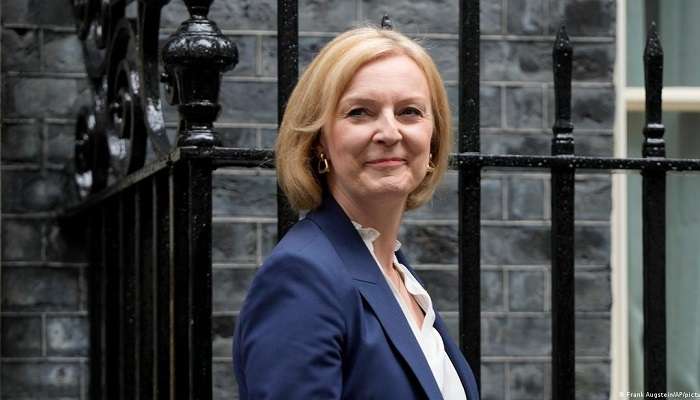
British Prime Minister Liz Truss had been struggling to keep her grip on power after a string of political tribulations since she came to office. She announced her resignation on Thursday.
In a short statement to the media, UK Prime Minister Liz Truss on Thursday announced an end to her time in office — after just over six weeks in the job.
Truss has faced mounting criticism after a tax-cutting mini budget unraveled spectacularly last month, sending markets and the pound sterling into freefall.
"I came into office at a time of great economic and international instability," Truss said. "Families and businesses were worried about how to pay their bills, Putin's illegal war in Ukraine threatens the security of our whole continent and our country has been held back for too long by low economic growth."
"We set out a vision for a low tax, high growth economy that would take advantage of the freedoms of Brexit," she said, adding: "I recognize, given the situation I cannot deliver the mandate on which I was elected by the Conservative Party."
The head of the 1922 Committee of Conservative Party lawmakers Graham Brady had visited the prime minister at her 10 Downing Street residence and office on Thursday. The committee arranges contests for a change of leader, and Brady's role is to gauge whether or not the prime minister still has the support of Tory members of parliament.
A number of Conservative lawmakers say they have submitted letters of no confidence in Truss to Brady, whose committee sets the rules for selecting and changing the party's leader. An unnamed member of the committee on Thursday told UK broadcaster ITV that the odds were against Truss lasting the day as prime minister.
Conservative lawmaker Simon Hoare had told the BBC that Truss had only a short time to turn the situation around.
"Nobody has a route plan. It's all sort of hand-to-hand fighting on a day-to-day basis,'' Hoare told the BBC on Thursday.
Where did it all go wrong?
Last month, Truss's government unveiled a policy of tax-cutting policy and higher borrowing that triggered financial turmoil. It sent the pound plummeting towards parity with the US dollar and spooked the market for UK government debt.
While markets and the currency have since shown a degree of recovery, the political and economic crisis saw Truss fire her Treasury Chief, Kwasi Kwarteng.
Earlier this week, Kwarteng's replacement as Chancellor of the Exchequer, Jeremy Hunt, announced that he was abandoning almost all of Truss's fiscal plans.
The prime minister's tenure has seen a general breakdown of discipline in the governing Conservative Party, with many lawmakers openly saying the prime minister should quit.
Truss suffered a further blow on Wednesday when Home Secretary Suella Braverman resigned after breaking security rules by sending an official document from her personal email account.
Braverman used her letter of resignation as Britain's interior minister to condemn Truss, saying she had "concerns about the direction of this government."
Later on Wednesday, there was widespread confusion among Conservative lawmakers about whether a vote on the practice of fuel fracking was a confidence vote in Truss's administration. Many of them did not vote with the government.